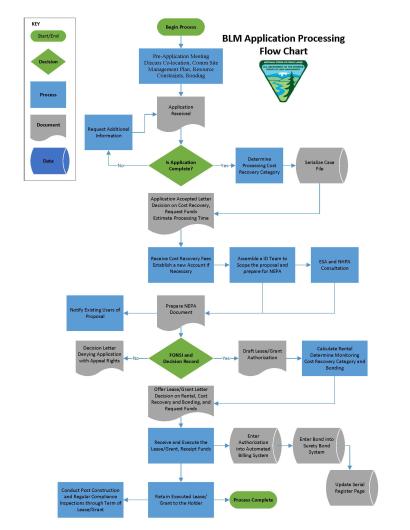How the BLM processes Right-of-way applications
The BLM has the discretion to grant a ROW if doing so is in the public interest.
Once you have filed an application (SF-299 completed with maps, POD and other details), a BLM realty specialist will review it to make sure all necessary information has been included.
Next, we evaluate the application to ensure the proposed use is in conformance with the BLM land use plan for the area in which it will be located and that there are no conflicts, such as other valid existing rights currently on the lands requested in your application.
If your proposed use is in conformance with land use plans and there are no apparent conflicts, we will determine the Processing Fee category based on the number of federal work hours expected to process the application. You are required to pay the (non-refundable) processing fee and provide any additional information that is needed before processing can begin.
Once the processing fees have been received, we will start formally processing your application. If we determine that it will take more than 60 days to process your application, you will be notified of the expected timeframe for processing the application.
ROW applications are generally processed in the order they are received. However, a thoroughly completed application can move ahead of a deficient application, and realty specialists must balance ROW applications with other workloads. The BLM specialist may need to complete required inventories and surveys, or consult with other agencies.
Weather and season of the year can affect the process. For example, you file an application late in the fall and the BLM archaeologist in the local office already has other workloads committed for that year. The archaeologist may not be able to complete the necessary field work before snowfall, and processing may be delayed until the following summer.
If specific resource issues or conflicts are identified in the proposed project area, it can extend processing time.
You may consider contracting with qualified individuals or firms to perform required inventories when the BLM has competing workloads. We may accept the work of certain qualified individuals and firms to do cultural resources and threatened and endangered species (T&E) inventories on the public lands. These firms do the field inventory and write reports for agency approval. This can often significantly reduce the processing time for your application and may also reduce the processing fee. This should be discussed during the pre-application meeting.
A ROW application may be denied for any one of the following reasons:
- The proposal is not in conformance with the applicable land use plan(s), i.e., purpose(s) for which the public lands are managed.
- The proposal would not be in the public interest.
- The applicant is not qualified.
- The proposal is inconsistent with Federal, state or local laws.
- The applicant is not technically or financially capable of accomplishing the project.
- Serious environmental consequences that cannot be mitigated may occur from the proposed project.

